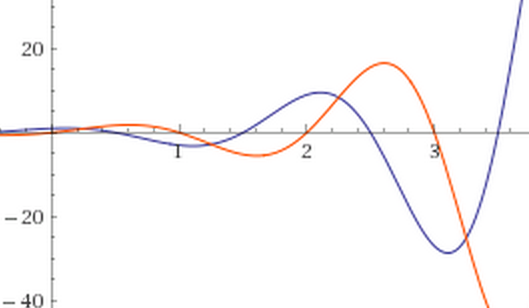Not complex at all

If
∫ 0 1 ( − 3 ) x d x = − a + i b
where i is imaginary unit. Find ⌊ 1 0 0 a b ⌋ .
Note: That the principal value of the complex exponentiation.
The answer is 45.
This section requires Javascript.
You are seeing this because something didn't load right. We suggest you, (a) try
refreshing the page, (b) enabling javascript if it is disabled on your browser and,
finally, (c)
loading the
non-javascript version of this page
. We're sorry about the hassle.
4 solutions
First note than ∫ a x d x = ln a a x then ∫ 0 1 ( − 3 ) x d x = ln ( − 3 ) ( − 3 ) x This evaluates to ln − 3 − 4 = − ln 3 ln − 1 4 , then from euler's identity i have that -\frac { 4 }{ \ln { 3 } +i\pi } =-\frac { 4 }{ \ln { 3 } +i \pi } \frac { \ln { 3-i \pi } }{ \ln { 3 } -i \pi } =\frac { -4\ln { 3 } +4i \pi }{ \ln { ^{ 2 } } { 3 }+\pi ^{ 2 } } =-\frac {4\ln { 3 } }{ \ln { ^{ 2 } } { 3 }+\pi ^{ 2 } } +\frac { 4\pi }{ \ln { ^{ 2 } } { 3 }+\pi ^{ 2 } } i now a= ln 2 3 + π 2 4 ln 3 , b= ln 2 3 + π 2 4 π and ⌊ 1 0 0 a b ⌋ = 4 5
∫ a x d x = ln a a x * for the fundamental theorem of calculus i have { a^{ x } }=\frac { d }{ dx } \frac { a^{ x } }{ \ln { a } } \\ a^x=\frac{1}{\ln{a}}\frac{d}{dx}e^{x\ln{a}}\\ a^x=\frac{1}{\ln{a}}e^{\ln{a^x}}\ln{a}\\ a^x=a^x
-3=3(CosPI+SinPI) Apply De Moivre's theorem
Let say u = ( − 3 ) x and we can have d u = ( − 3 ) x ( ln ( 3 ) + i π ) d x or ln ( 3 ) + i π d u = ( − 3 ) x d x :
So,
∫ 0 1 ( − 3 ) x d x = = = = = ∫ 1 − 3 ln ( 3 ) + i π d u ln ( 3 ) + i π u ∣ 1 − 3 ln ( 3 ) + i π − 4 ( ln ( 3 ) ) 2 − ( i π ) 2 ( − 4 ) ( ln ( 3 ) − i π ) ( ln ( 3 ) ) 2 + π 2 ( − 4 ) ( ln ( 3 ) ) + ( ln ( 3 ) ) 2 + π 2 4 π i
⟹ ⌊ 1 0 0 ∗ ( ln ( 3 ) ) 2 + π 2 ( 4 ) ( ln ( 3 ) ) ∗ ( ln ( 3 ) ) 2 + π 2 4 π ⌋ = 4 5
∫ 0 1 ( − 3 ) x d x = ∫ 0 1 ( 3 e i π ) x d x e i π = cos π + i sin π = − 1 = ∫ 0 1 ( e ln 3 e i π ) x d x e ln 3 = 3 = ∫ 0 1 e ( ln 3 + i π ) x d x = [ ln 3 + i π e ( ln 3 + i π ) x ] 0 1 = [ ln 3 + i π ( − 3 ) x ] 0 1 = ln 3 + i π ( − 3 ) 1 − ( − 3 ) 0 = ln 3 + i π − 4 = ( ln 3 ) 2 + π 2 − 4 ln 3 + i 4 π = − 0 . 3 9 6 7 3 4 3 4 6 + i 1 . 1 3 4 5 0 1 8 8
⇒ ⌊ 1 0 0 a b ⌋ = ⌊ 4 5 . 0 0 9 5 8 6 1 5 ⌋ = 4 5